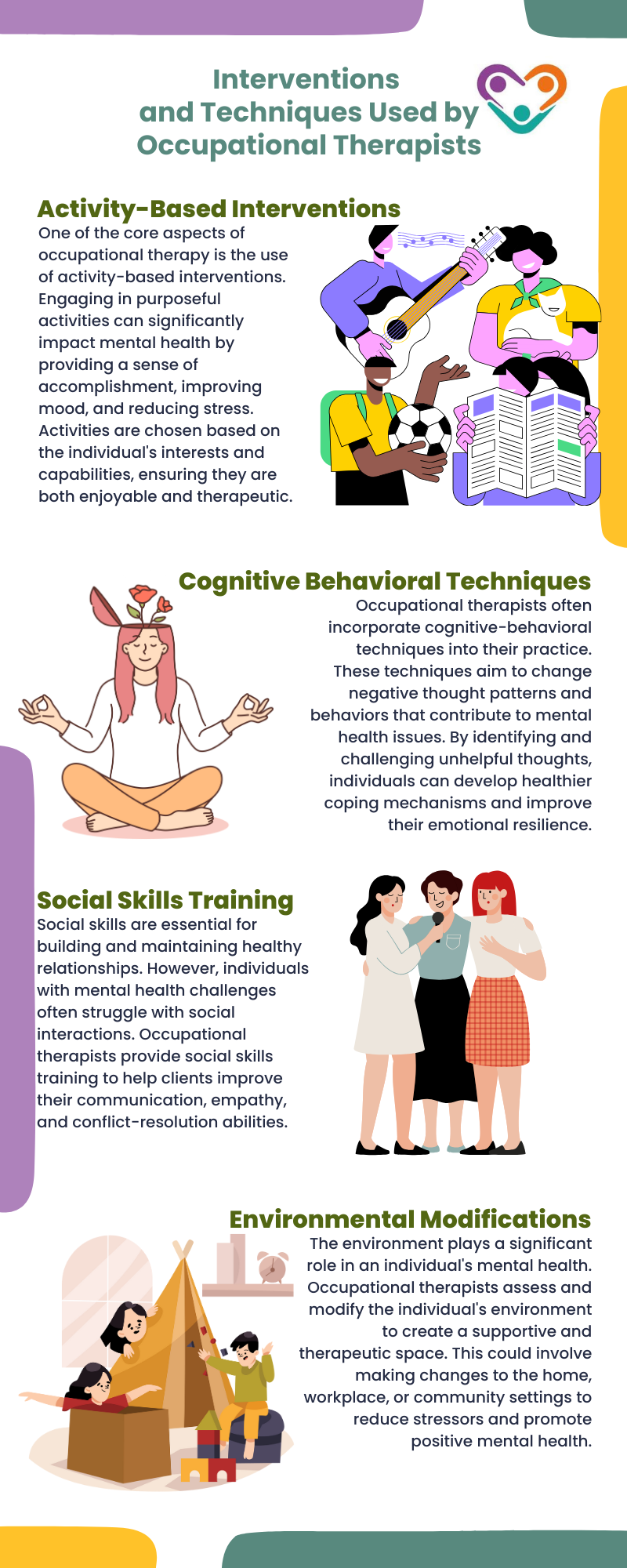Occupational therapy (OT) is often associated with helping individuals regain physical capabilities after an injury or illness. However, occupational therapists also play a vital role in mental health. This branch of OT focuses on enabling individuals to participate in daily activities despite mental health challenges.
By promoting mental well-being and improving functional abilities, occupational therapists help individuals lead fulfilling lives.
In this article, we’ll look at the various roles and interventions of occupational therapists in mental health, all while exploring their approaches and the benefits they bring to clients.

What Does an Occupational Therapist Do for Mental Health?
Occupational therapy in mental health is centered around the idea that engaging in meaningful activities can enhance mental well-being and overall quality of life. Unlike traditional mental health therapies that may focus solely on talk therapy or medication, occupational therapy integrates physical, emotional, and social aspects of a person’s life.
The holistic approach ensures that individuals not only manage their mental health symptoms but also build the skills necessary for daily living and personal growth.
The initial phase of occupational therapy involves a comprehensive assessment. OTs evaluate various aspects of an individual’s life, including their physical health, emotional state, social interactions, and daily routines. This assessment helps identify the specific challenges faced by the individual and the factors contributing to these difficulties.
Based on the assessment, occupational therapists develop personalized treatment plans. These plans are tailored to the unique needs and goals of the individual, focusing on enhancing their ability to perform daily activities, manage stress, and engage in meaningful social interactions.
The treatment plans are dynamic and evolve as the individual’s needs change over time.
Interventions and Techniques
Occupational therapists employ a variety of interventions and techniques to support individuals with mental health issues. These interventions are designed to address specific challenges and promote overall well-being.
They’re as follows:

Promote Independence and Daily Functioning
A primary goal of occupational therapy in mental health is to promote independence and improve daily functioning. Mental health issues can significantly impact an individual’s ability to perform everyday tasks, such as personal hygiene, cooking, and managing finances.
Occupational therapists work with clients to develop practical skills and strategies for managing these tasks effectively.
Self-Care and Hygiene
Personal hygiene and self-care are fundamental aspects of daily living that can be challenging for individuals with mental health issues. Occupational therapists provide education and support to help clients establish routines for self-care. This might include setting reminders for regular hygiene practices, developing step-by-step plans for complex tasks, and using adaptive equipment if necessary.

Meal Preparation and Nutrition
Proper nutrition is crucial for mental and physical health, but meal preparation can be overwhelming for some individuals. Occupational therapists assist clients in planning and preparing nutritious meals.
This might involve teaching cooking skills, creating shopping lists, and developing meal plans that align with the individual’s dietary needs and preferences.
Financial Management
Managing finances can be a significant source of stress for individuals with mental health challenges. Occupational therapists provide practical support in budgeting, paying bills, and managing expenses. They may work with clients to develop financial plans, set financial goals, and use tools such as budgeting apps to track spending.

Enhance Emotional Well-Being
Occupational therapy also focuses on enhancing emotional well-being by helping individuals develop healthy coping mechanisms and emotional regulation skills. Mental health issues can lead to intense emotions and difficulty managing stress, which can impact overall functioning.
Here are the key areas they address:
Stress Management
Stress management is a crucial component of occupational therapy in mental health. Occupational therapists teach clients various techniques to manage stress effectively, such as deep breathing exercises, progressive muscle relaxation, and mindfulness practices.
By incorporating these techniques into their daily routines, individuals can reduce anxiety and improve their ability to cope with stressors.
Emotional Regulation
Emotional regulation involves recognizing and managing emotions in a healthy way. Occupational therapists work with clients to identify their emotional triggers and develop strategies for regulating their emotions. This might include journaling, practicing mindfulness, or engaging in activities that promote relaxation and emotional balance.
Building Resilience
Building resilience is essential for navigating the challenges of mental health issues. Occupational therapists help clients develop resilience by encouraging them to set realistic goals, celebrate their achievements, and learn from setbacks. By fostering a growth mindset, individuals can build the strength and confidence needed to overcome obstacles and thrive.

Support Specific Mental Health Conditions
Occupational therapists work with individuals experiencing a wide range of mental health conditions, tailoring their interventions to meet the specific needs of each condition. Here, we explore how occupational therapy supports individuals with some common mental health conditions.
Depression
Depression can significantly impact an individual’s motivation, energy levels, and ability to perform daily tasks. Occupational therapists help individuals with depression by setting achievable goals, establishing routines, and engaging in activities that promote a sense of accomplishment and purpose.
For example, an OT might encourage a client with depression to start with small, manageable tasks, gradually building up to more complex activities. They may also introduce activities that align with the client’s interests and values, providing a sense of enjoyment and fulfillment.
Anxiety Disorders
Anxiety disorders can cause excessive worry, fear, and avoidance behaviors. Occupational therapists help individuals with anxiety disorders develop coping strategies to manage their symptoms and improve their ability to participate in daily activities.
This might involve practicing relaxation techniques, developing exposure plans to gradually face feared situations, and creating structured routines to reduce uncertainty. By addressing the underlying causes of anxiety and providing practical tools, OTs help individuals regain control over their lives.

Bipolar Disorder
Bipolar disorder involves mood swings between depressive and manic episodes, impacting an individual’s ability to maintain stable routines and relationships. Occupational therapists support individuals with bipolar disorder by helping them establish consistent daily routines, manage energy levels, and develop strategies for maintaining stability during mood fluctuations.
For instance, an OT might work with a client to create a balanced daily schedule that includes time for self-care, work, and leisure activities. They may also provide education on recognizing early signs of mood changes and developing action plans to manage these changes effectively.
Schizophrenia
Schizophrenia is a complex mental health condition characterized by symptoms such as hallucinations, delusions, and cognitive impairments. Occupational therapists help individuals with schizophrenia improve their daily functioning, social skills, and overall quality of life.
Interventions might include cognitive rehabilitation exercises to enhance cognitive functioning, social skills training to improve communication and interpersonal relationships, and support in managing daily tasks such as personal hygiene and medication management.

The Role of Occupational Therapy in Mental Health Recovery
Recovery from mental health issues is a highly individualized process, and occupational therapy plays a crucial role in supporting this journey. Occupational therapists adopt a client-centered approach, empowering individuals to take an active role in their recovery and achieve their personal goals.
Empowerment is a key principle in occupational therapy. By involving clients in the decision-making process and respecting their autonomy, OTs help individuals regain a sense of control and agency over their lives. This collaborative approach fosters motivation and engagement, essential for successful recovery.
Goal setting is another fundamental aspect of occupational therapy. Occupational therapists work with clients to set realistic, achievable goals that align with their values and aspirations. These goals provide direction and purpose, helping individuals stay focused and motivated throughout their recovery journey.
Strong support networks are also essential for mental health recovery. Occupational therapists help clients build and maintain supportive relationships with family, friends, and community members. They may also connect clients with support groups and community resources, providing additional sources of encouragement and assistance.
The Evidence Base for Occupational Therapy in Mental Health
Occupational therapy in mental health is supported by a growing body of research evidence. Studies have demonstrated the effectiveness of occupational therapy interventions in improving mental health outcomes and enhancing quality of life.
For example, research has shown that activity-based interventions can reduce symptoms of depression and anxiety, improve mood, and enhance overall well-being. Cognitive-behavioral techniques used by occupational therapists have been found to be effective in reducing negative thought patterns and improving coping skills.
Social skills training has been shown to improve communication and interpersonal relationships, reducing feelings of isolation and loneliness. Environmental modifications have been found to create supportive spaces that promote positive mental health.
A study found that occupational therapy interventions significantly improved the functional abilities and quality of life of individuals with mental health conditions. Another study found that occupational therapy interventions were effective in reducing symptoms of anxiety and depression and improving daily functioning.
These findings highlight the important role of occupational therapy in mental health and the positive impact it can have on individuals’ lives.
As the evidence base for occupational therapy in mental health continues to grow, it is clear that occupational therapists play a crucial role in helping individuals achieve optimal mental health and overall well-being. They focus on enhancing daily living skills, managing stress, improving social interactions, and promoting emotional regulation. If you seek comprehensive mental health support that integrates occupational therapy, consider exploring ABA therapy in New Jersey, Indiana, Georgia, and New York through Golden Care Therapy. Contact us or visit our website for more information or to schedule a consultation.
Sources:
https://aboutoccupationaltherapy.com.au/mental-health
https://www.verywellmind.com/what-to-expect-from-a-mental-health-ot-2509980



